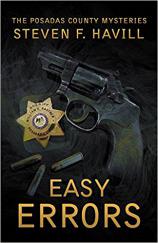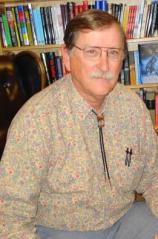Author Talk: November 14, 2017
While EASY ERRORS is Steven F. Havill’s 22nd Posadas County mystery, it is also the first in the series --- chronologically speaking. When the opening installment, HEARTSHOT, published in 1991, Bill Gastner was the county Undersheriff. Over time Bill became Sheriff, then retired, and Robert Torrez took over the top spot. But what were Torrez's first days as a rookie officer like? In this interview, Havill explains why he decided to follow up his first prequel, ONE PERFECT SHOT, which told the story of Estelle Reyes-Guzman's first day on the job, with a second one; his fascination with New Mexico, which is the setting for the series and has virtually become a character in his stories; and what led him to delve into the mystery genre after writing four westerns.
Question: While this new novel is your 22nd in the Posadas County series, which you launched in 1991, it's also the first in the series --- chronologically. What gave you the idea to place this book back in 1986, before the official start of the series?
Steven F. Havill: This is the wonderful thing about loyal readers. The first prequel I did, telling the story of Estelle Reyes-Guzman's first day on the job, ONE PERFECT SHOT, was written by request. Folks enjoyed that, and one of my readers said, "Hey...I'd like to read about Bobby Torrez's first days on the job. So EASY ERRORS came to be.
Q: Most authors claim to be unable to answer this kind of question, but we will pose it anyway: Which of the 22 books in the Posadas County series would you say is your favorite?
SFH: He blushed and then said, "Gosh, I like 'em all! I'm my favorite author! But I tend to lean toward the newest one. Writers grow with time and experience, and I don't mean just waistline. I'm a better writer now than when I wrote HEARTSHOT. Hopefully, I'll continue to improve.
Q: Have you been a mystery reader all your life? Name three authors whose work influenced you as you began writing the Posadas County novels.
SFH: I started out writing westerns, because I couldn't stand to read them. All the heroes were broad-shouldered and flinty-eyed, and never missed a shot. Anyone who shot that much in real life would be stone deaf! So I decided to write my own, and at the same time decided to involve a physician prominently in each story. The history of medicine is a hobby of mine. I wrote four westerns just as the western mania died out, and my then-agent said, "How about writing mysteries?" So I did.
I can't think of any particular writers who influenced me. There are many whom I like. I read voraciously, and indiscriminately. I like James Patterson, Joe Badal, Sue Grafton and a host of others.
Q: From which of these do you derive more pleasure --- completing a novel and sending it off to your editor, or sitting down to begin work on a brand new story?
SFH: Truthfully, after writing 28 novels, the initial thrill of having one accepted, of finishing one, has worn a little thin. It's work, and I breathe a sigh when it's done. Then, the NEXT DAY, I start a new story.
Q: Your beat is New Mexico, just as C.J. Box has carved out his territory in Wyoming, and Robert B. Parker had Boston and Massachusetts. Whose regional series being written today do you particularly enjoy reading for pleasure?
SFH: I like Box, and once in a while, J.A. Jance. I knew Tony Hillerman, even took a couple of college classes from him, and loved his earlier, simple stuff. Anne Hillerman is filling his huge shoes, and I like her stories, too. As I said, I read a bunch. I give a book about three pages to hook me, and if it doesn't, it goes back to the library. Life is too short to read dull books. I also love biographies and historical fiction. I'm awful at remembering authors’ names. Sometimes I forget my own.
Q: New Mexico has virtually become a character in your stories. What do you personally find fascinating about it as a setting for this series?
SFH: The best part of New Mexico is when you get out of the cities, out of the interstate traffic, and turn onto a dirt two-track that humps and bumps who knows where. The smell of the grasses, sage, kochia and whatnot baking against the catalytic converter is a fantastic ambrosia. Stop, turn off the engine (as Bill Gastner does) and listen to the SILENCE...and wonder about the ambient noise that urban folks have gotten used to as part of their environment. Gaze into the distance and ponder that there are NO human dwellings in sight. All of that makes some folks nervous, but I think it's wonderful.




